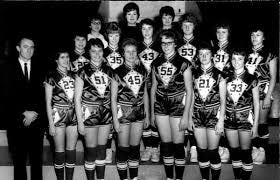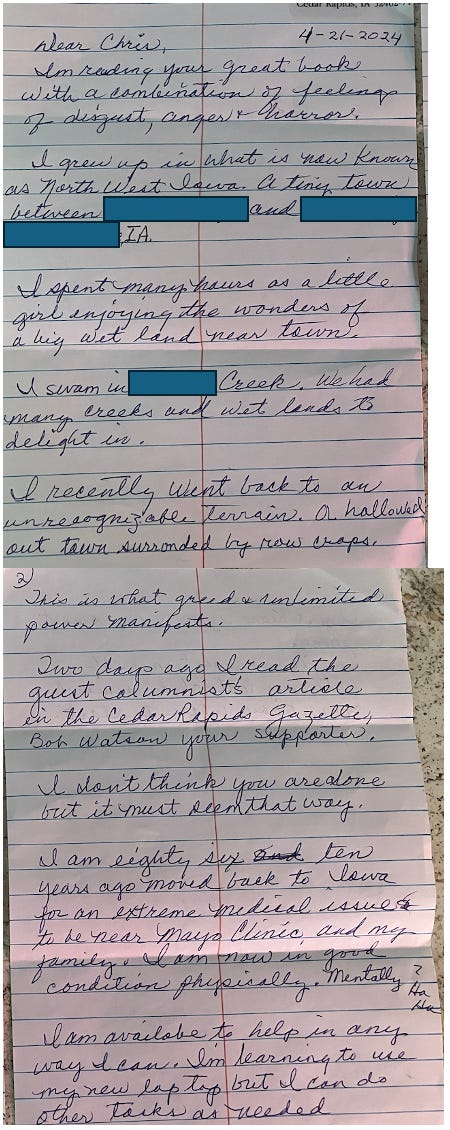This past Saturday I drove 277 miles from Iowa City to the far western Iowa town of Onawa to be the keynote speaker at the Loess Hills Prairie Seminar at West Monona High School.
Onawa is perched on a hump of land between the Missouri and Little Sioux Rivers. About 12% of the city’s structures are vulnerable to flooding at least once every 100 years.
To call the Little Sioux a river here is about like calling a sewage lagoon a lake. It’s been channelized and diked and polluted into an ogre of a river so the Missouri floodplain could be cropped with corn and soybeans. I asked around if anybody uses it for recreation—no was the answer.
With a population of about 2900, Onawa is the largest city in the 100 miles between Council Bluffs and Sioux City. Monona County (home of Onawa) has 8731 people, half of what were there in 1950.
West Monona High School won 29 straight games and the girls’ state basketball championship in 1964, back when small town Iowa dominated the then six-on-six game. My recollection is that Des Moines High Schools didn’t even have girls’ basketball until the ‘70s. Younger generations cannot possibly imagine how far out in front rural Iowa was in providing athletic opportunities for girls and women, and paving the way for Caitlin Clark and thousands of others to play in a state where female athletes are admired as much as their male counterparts.
Western Iowa is very sparsely populated. Iowa’s seven least-populated counties (Adams, Ringgold, Audubon, Taylor, Osceola, Fremont and Wayne) all drain to the Missouri River and have a combined 38,600 people, giving them the population density of North Dakota. My guess is 38,600 live within 2 miles of me here in Iowa City.
Just to the east of Onawa lie the Loess Hills, one of two landscapes in Iowa (the Driftless Area is the other) that retain some ecological integrity. Call it an oasis in a corn desert. Anyone that has seen even a modest mountain will not be blown away by the Loess Hills’ majesty; like the Driftless, the western spine of Iowa benefits greatly in the mind’s eye from the surrounding abomination. The 45 miles between Denison and the Loess Hills might be one of the prettiest drives in the state, if you could turn a blind eye to the horrifying erosion, clobbered rivers and colossal cattle feedlots.
I can’t. Turn a blind eye, that is.
I got this letter in the mail recently. It’s not the first such letter I’ve received. I blocked out a few things to avoid revealing the writer’s identity. It crystallizes for me what has happened to the rural Iowa of my youth, back when the West Monona girls ruled Vets Auditorium in Des Moines.
Does anybody out there in establishment politics and agriculture (one and the same in many cases) care about rural Iowa? I don’t think they do, at least not beyond using its imagery for propaganda. I’ve lived in urban Iowa most of my life, and my observation of its take on rural Iowa is that it has no take. People in Iowa City and Ankeny and Des Moines think about rural Iowans about as often as they think about their cell phone plan, that is, only when forced to.
I’ve done three events in Missouri with a rural advocate for that state: Jess Piper. She recently wrote in her substack how American society has been fed a banquet of angry, racist, and gun-hugging tripe about rurals, and I believe this tripe contributes to the feelings almost all of us have about national dysfunction. As Jess says, rural people aren’t all farmers, not many of them have generational wealth and they don’t vote against their self-interest. A lot of them, however, drink well water contaminated by a landed gentry that rules the countryside.
It's true enough that rural Iowa and rural America are now the base of Republican Party power. In the words of my friend Jim Larew, the Republican Party has captured the cultural moment, especially in rural areas where a natural, geographical insularity has always acted as a shroud for cultural change. One drive through rural Iowa will show you how real that geographical insularity is.
Many have marveled at how Barack Obama could’ve carried several rural Iowa counties; “how” is this: most of these people are no more close-minded or racist than anybody else. Believe me, there is plenty of racism in the so-called People’s Republic of Johnson County where I live, which voted >70% for Joe Biden.
In retrospect it’s easy to see that Iowa Democrats thought Obama unlocked rural Iowa’s front door for them; it’s also apparent now that they’ve been handed their hat, and their ass still stings from the door slamming shut upon it. They’ve responded by putting silo pictures on the party’s website, hauling in hay bales for campaign events and filming campaign commercials in the barnyard of millionaire farmers. Not surprisingly, they haven’t tried to tackle environmental decline and its effect on the quality of rural life and rural health.
A theme that won’t die is that environmental issues are those of tree huggers and pantheists, and they’re not mainstream concerns of everyday Iowans. That’s bullshit, especially when your well has been contaminated by customers of Koch Industries and the landscape of your youth has been drained, plowed under, polluted and sterilized.
I do not speak at an event (and I do a lot of events) without people expressing their feelings of hopelessness and powerlessness to affect change on environmental issues. I’m frequently asked if they shouldn’t just move away. Quite a few think I have the answers—I don’t. I do know with a certainty, however, that things will not get better without a fight—maybe that’s why many Iowa Democrats avoid the issue. But a fight it will be and many battles will be lost. And while Democrats can be accurately characterized as dumb and sometimes dishonest about this, Republican policy is downright sinister.
So much of the state’s water, especially streams draining to the Missouri River, is not salvageable in any reasonable time frame. And the current political and economic establishment is not going to allow transition to more sustainable agricultural production systems. They’ll only allow the smallest parcels of the very worst farmland to be restored to a natural condition. You can’t sell expensive GMO seed and crop insurance for restored prairie and wetland, after all. Our politics and our institutions have prioritized bushels and hooves over the barest minimum in environmental integrity a modern society should be able to expect. Rural Iowans shoulder the heaviest burden of the pollution.
For these reasons I think the wagons need to be circled, at least for the time being, around Northeast Iowa where some clean water and ecological integrity still remain on the landscape. To that end, I have agreed to serve as the President of a new NGO that will focus on a mission of defending that region, its water, its environment and its people: Driftless Water Defenders.
DWD is an Iowa non-profit, 501(c)3 membership corporation, and we will advocate, educate and litigate to defend Iowa citizens’ fundamental right to access clean water for their homes, businesses and recreational needs. We’re not about putting diapers and bandaids on the landscape to hoodwink the public about progress. We think Iowans’ right to clean water and the fundamental human need to enjoy nature have been brazenly trampled by the boots of Iowa agriculture. We intend to fight.
The public is invited to attend the first meeting hosted by Driftless Water Defenders. This free event will be held at 3 pm on June 15th at Good Shepard Lutheran Church, 701 Iowa Ave, Decorah, IA. At the meeting, we will describe and answer questions about the deteriorating condition of lakes, aquifers, streams and rivers in Iowa’s Driftless area—some of which are becoming unsafe for drinking, fishing and swimming.
I also encourage you to mark August 7th on your calendar. Jess Piper and I have scheduled a free event at 6 pm at the Big Grove Brewery in Iowa City where we will discuss how depopulation and decline of rural Iowa and Missouri links closely with consolidation in agriculture and the environmental degradation of rural areas.
I’m receiving no salary for my role with DWD. So, if you’re paid subscriber to my column, know that your dollars are supporting this work, and I thank you. If you’re unable to afford a paid subscription, please know that I value your readership and I encourage you to follow news and developments of the Driftless Water Defenders that will appear in my column, right along with the usual mix of muckraking, science, scatological jokes and outdoor tips.








Let's get down to where and how things really happen! I'm 74 years old, a veteran of two years in Vietnam, and 50% disabled due to Agent Orange and other stuff. I walk ditches and clear dumpsters of cans and bottles for recycling and all that money goes to people who are trying to make a difference, locally or further afield. I grew up here, and I know what it was like, when I don't see a meadowlark on a fence post anywhere something terrible has happened. When you can't swim in lakes, some of which are in State Parks, something terrible has happened. With 700 waterways so polluted you are fool hardy to stick you foot into them or let you dog play in the water, something terrible has happened. With that said, where do I send you a check to give you money to work with! This is what is needed more than anything, and I'm working to promote this activity in a way that is ecological and cleaning up the neighborhood and reducing the need for more space in the landfill for material that has no business there!
This is great. As I read this, I’m in Jefferson, Iowa, getting ready to attend the funeral of a dear aunt on whose farm I spent long stretches of my childhood. I can so remember the days of clear streams and nearby lakes we didn’t think twice about swimming in. The pigpens held 15 or so hogs outdoors the cattle grazed in the timber (and not in the CAFO currently down the road).
That letter from your correspondent brought tears to my eyes. And your writing made my blood boil. Bravo to you and all best on your new project.